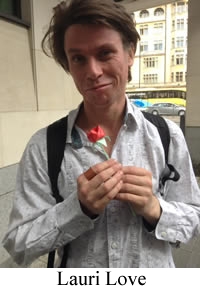 British computer scientist and activist Lauri Love is facing extradition to the U.S. and decades in prison for protesting the persecution of U.S. internet activist Aaron Swartz.
British computer scientist and activist Lauri Love is facing extradition to the U.S. and decades in prison for protesting the persecution of U.S. internet activist Aaron Swartz.
RootsAction Education Fund and the Courage Foundation, based in the U.S. and Europe, respectively, is teaming up to support Love, who faces potential extradition in a hearing later this month.
Half of the proceeds raised will go to RootsAction Education Fund, and the other half will be a charitable donation to help fund Love's legal defense, to keep him from the exacerbation of illnesses that an extradition would certainly bring on. Donations are tax-deductible in the United States.
Lauri Love is a computer scientist from Stradishall in the UK who has a long history of political activism. He played a prominent role in the student and Occupy movements in Glasgow, Scotland, during 2011-2012. Love is facing potential extradition to the United States for his alleged involvement in #OpLastResort, the series of online protests that followed the persecution and suicide of Aaron Swartz.
Love is being pursued by the U.S. criminal justice system for allegedly protesting abuses by that same system, with prosecutors in three U.S. court districts accusing Love of hacking into various government websites.
Love's extradition hearing thus far has shown that justice would mean keeping him at home, and that any trial should happen in the UK. The U.S. must not be allowed to extradite without showing evidence, without proving damage, and for a crime allegedly committed on UK soil.
Click here to help make the difference needed.
Sarah Harrison, Courage's acting director, said: "With RootsAction's help, we can bring much needed attention to Lauri Love's case on both sides of the Atlantic. Remember that while awaiting a ruling, Lauri Love needs to prepare for trial in the U.S. and the UK, needing two legal teams to work together. Lauri has already taken a stand for the encryption rights of British citizens -- now it's our turn to take a stand for him."
Britain's National Crime Agency (NCA) has seized Lauri's computers, held them for years, and attempted to force him to turn over encryption keys — all without charging him with a crime. Lauri has never been to the United States, but that's where he faces charges that could amount to a total of 99 years in jail.
In May, Judge Nina Tempia rejected the NCA's attempt to "circumvent" statutory safeguards in its grab for Lauri's keys. Lauri refused to provide his keys in order to take a stand for encryption nationwide, as an NCA victory would have set a dangerous precedent for Britons' information security.
Then in June, Lauri's extradition hearing heard testimony from his parents, doctors, and professors who warned about the mental health risks Lauri would face in a U.S. prison. Lauri has Asperger Syndrome and depression, and in the U.S. he'd likely be thrown into solitary confinement, an ocean away from his support network, and without proper medical attention. Witnesses also testified to the good work Lauri is currently doing in the UK, as Chief Hacking Officer for My Hacker House, where he puts his computer skills to socially helpful use.
Judge Tempia will issue her ruling on Lauri's extradition on September 16. Her decision will finally test the "forum bar," enacted in the UK in an attempt to rectify problems with the US-UK extradition treaty, which has historically been one-sided, sending vulnerable defendants to the United States without a need to demonstrate a prima facie case. Lauri argues that, if he has allegations to answer, he should be able to face them in the United Kingdom, where he lives and where digital activsts face much smaller sentences than they do in the U.S.
Lauri Love said: “Computer trials in the U.S. are Sisyphean. Because I'm facing three separate indictments, with decades of jail looming over my head on each one, they can force me into a plea deal in one jurisdiction, sentence me to several years, close that case and then do it all over again. In the UK there's at least a sense of proportionality to the alleged offense."
Tags: Lauri Love, Aaron Swartz